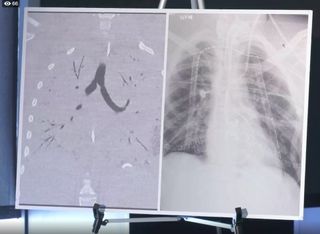Doctors just performed what appears to be the first double-lung transplant for a patient suffering from vaping-related injury.
The 17-year-old patient had been sustained on an ECMO machine, which helps support heart and lung function, for more than a month before undergoing surgery, his medical team reported during a news conference today (Nov. 12). "He wouldn't have survived even minutes without it," said Dr. Hassan Nemeh, a thoracic surgeon at the Henry Ford Hospital in Detroit who helped conduct the operation.
The lung transplant itself took place on Oct. 15 and took about six hours to perform. Now, the teenager can breathe without support and is undergoing physical therapy to regain his strength, his doctors said. The teenage patient's condition was so poor that quickly he got bumped to the top of the national waiting list for lung transplants, Nemeh said. (A standardized scoring system determines who needs transplants most urgently, not the doctors themselves, he added.)
"The lung itself was so firm and scarred — this is an evil that I haven't faced before," Nemeh said. CT scans of the teenager's lungs revealed extensive inflammation and scarring of the tissue. The areas of the organ that contain air typically appear black on a CT scan; but in the patient, hardly any black showed up at all on his scan. Spots of dead tissue speckled both lungs, signalling to the medical team that the damage was "irreversible," said Victor Coba, a specialist in critical care medicine at Henry Ford who also treated the patient.
The patient, who was only 16 when first admitted to hospital, will take months to fully recover and will have to adhere to particular instructions to maintain his health in the long term, his doctors said.
The patient did not participate in the news conference but asked his medical team to "share photographs and an update to warn others" about the dangers of vaping-related lung injury. His family contributed a written statement to the conference, stating that the teenager went "from the typical life of a perfectly healthy 16-year-old athlete," sailing, playing video games, and hanging out with friends, "to waking up intubated and with two new lungs." They expressed their hope that others would be compelled to stop vaping after hearing the patient's story.
Although the first to receive a lung transplant, the teenage patient represents just one of more than 2,050 cases of e-cigarette or vaping-associated lung injury reported since March, according to the Centers for Disease Control and Prevention (CDC). The illness, also known as EVALI, has affected people in every U.S. state except Alaska and claimed 39 lives so far.
Most affected patients report having used products that contain THC, the main high-inducing compound in cannabis. Studies suggest that vape fluids that contain this psychoactive chemical may "play a major role in the outbreak," according to the CDC. At this time, the Henry Ford medical team did not specify what kind of vaping products the teenage patient used.
Last Friday, the CDC announced that its investigators had linked a potentially dangerous chemical to the outbreak of vaping-related illness. The "very strong culprit of concern" — a compound called vitamin E acetate — can be added to vaping fluids as a thickening agent and sticks to the lungs like "honey" when inhaled, the AP reported. The compound also resembles THC oil, according to the CDC, so it's often used to cut, or dilute, vaping liquids that contain THC.
The CDC recommends that people avoid buying vaping products "off the street" or modifying vaping liquids or devices as bought from a manufacturer. The organization recommends that those who vape monitor themselves for unusual symptoms, though to be completely safe people should avoid the use of vaping products altogether, particularly those containing THC.
"Our teenage patient would have faced certain death if not for the lung transplant," Nemeh said. "It's a senseless disease — totally preventable."
Originally published on Live Science.


